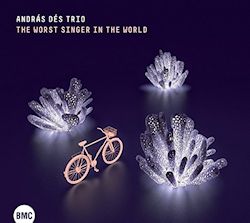 BUY NOW AmazonUK AmazonUS |
ANDRÁS DÉS TRIO The Worst Singer in the World
|
Interplay I. – Outside
Gardening
Hommage
Interplay II. – Inside
Holding Your Hand, 150 Seconds Before Midnight
Transparent Afternoon
Sea at Second Sight
Lullaby Under the Sky
Márton Fenyvesi (steel string guitar, pedals and loops): István Tóth (nylon string guitar): András Dés (percussion)
Recorded February 2017, BMC Studio, Budapest
This intriguing ensemble, in which steel string and nylon string guitars weave over percussion leads, is predicated largely on texture and colour. It also offers a splendid master-class in transparency as the Intro of this nine-track, 45-minute album eloquently shows with its textural sensitivity. The Hungarian trio, led by András Dés, may enjoy jokey album titles - the only singing comes in a single track and is what I’d prefer to call vague vocalising – but this set of originals is full of glint and richness. In this way a quite funky groove develops in Interplay 1 – Outside whilst the exciting Gardening falls into defined sections, passages hinting at the Iberian, alongside fast lithe runs over the leader’s crisply assertive drumming.
This segues nicely into Hommage, with its burnished and rocking rhythm, a genre-defying mélange, neither specifically jazz nor really Rock, nor even specifically Classical – though embodying elements of each. It seems to embody the dilemma of this trio for listeners who like set categories. The trio is at its most allusive, reflective and sparing in Interplay II – Inside which is courageously deft and sees a greater quotient of guitar vibrato. Perhaps the central point of the album comes in Holding Your Hand, 150 Seconds Before Midnight, a supple ballad that stops and reprises and generates a real sense of expressive relaxation. By contrast there’s an almost jubilant quality in the repeated figures of Transparent Afternoon, where the athletic guitar work and versatile percussion are delightfully done. One senses folkloric influence on Sea at Second Sight (one also senses a pun in the title) where the leader’s percussion is at its most shimmering. In that respect Dés is, throughout the disc, busy with his phalanx of percussive impedimenta. He plays, inter alia, cajon, cymbals, framed drums, the canna, bodhran, the kalmiba (a miniature sub-Saharan instrument), as well as vocalising.
This disc is not for everyone. It takes its inspiration from a variety of sources, both traditional and non-traditional. Look for jazz and you won’t find it. But if you allow the timbral suggestibility of the music to percolate, you will enjoy a rich tapestry of entwining voices, sound-worlds, and musical horizons.
Jonathan Woolf